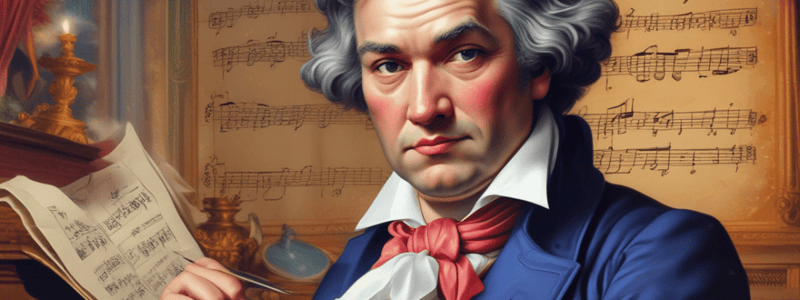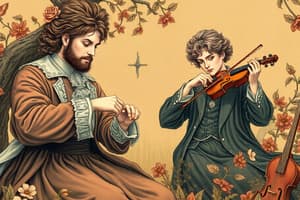Podcast
Questions and Answers
Which of the following is true about Beethoven's Symphony No. 3?
Which of the following is true about Beethoven's Symphony No. 3?
- Included only two horn parts in the orchestra
- Expanded in scale compared to Haydn and Mozart symphonies (correct)
- Originally dedicated to Mozart
- Followed the traditional symphonic structure of his time
During which period did Beethoven begin his forays into Romanticism?
During which period did Beethoven begin his forays into Romanticism?
- Beethoven never composed Romantic music
- Early Period
- Middle 'Heroic' Period (correct)
- Late Period
What type of music is Beethoven's Symphony No. 6 known as?
What type of music is Beethoven's Symphony No. 6 known as?
- Revolutionary Symphony
- 'Heroic' Symphony
- Epic Symphony
- 'Pastorale' Symphony (correct)
How did Beethoven's Symphony No. 5 expand the orchestra in the last movement?
How did Beethoven's Symphony No. 5 expand the orchestra in the last movement?
What personal event influenced Beethoven's compositions during the Middle 'Heroic' Period?
What personal event influenced Beethoven's compositions during the Middle 'Heroic' Period?
Which key does Beethoven's Symphony No. 1 begin in, deviating from the norm?
Which key does Beethoven's Symphony No. 1 begin in, deviating from the norm?
What type of music form did Beethoven start using instead of minuets in his Symphonies?
What type of music form did Beethoven start using instead of minuets in his Symphonies?
Which symphony by Beethoven is characterized by unifying motivic material with the pattern short, short, short, long?
Which symphony by Beethoven is characterized by unifying motivic material with the pattern short, short, short, long?
"Symphony No. 3" by Beethoven was initially dedicated to which historical figure?
"Symphony No. 3" by Beethoven was initially dedicated to which historical figure?
"Symphony No. 6" by Beethoven is also known as:
"Symphony No. 6" by Beethoven is also known as:
Which composer was known for emphasizing orchestration and interesting tonal colors in his music?
Which composer was known for emphasizing orchestration and interesting tonal colors in his music?
Which composer utilized the idea of 'Leitmotif' in his music?
Which composer utilized the idea of 'Leitmotif' in his music?
Which composer was most famous for Italian opera and minimized the distinction between recitative and aria?
Which composer was most famous for Italian opera and minimized the distinction between recitative and aria?
Who among the composers began linking themes to characters and included supernatural elements in serious operas?
Who among the composers began linking themes to characters and included supernatural elements in serious operas?
Which composer was associated with the term 'Bel Canto' style of singing characterized by emotional, long melodies?
Which composer was associated with the term 'Bel Canto' style of singing characterized by emotional, long melodies?
Who composed the Symphony No. 9 known as the 'Choral' symphony with the inclusion of soloists and chorus?
Who composed the Symphony No. 9 known as the 'Choral' symphony with the inclusion of soloists and chorus?
'Art Song' or Lied is associated with which composer, who used romantic poetry as text?
'Art Song' or Lied is associated with which composer, who used romantic poetry as text?
Flashcards are hidden until you start studying
Study Notes
Beethoven's Life and Music
- Born in 1770 in Bonn
- Studied with Haydn in Vienna in 1792
- Began going deaf in 1802
- Given joint custody of his nephew after his brother's death in 1815
- Early Period (up to 1802): composed in Classical style, revered Mozart's works, and felt anxious about Haydn's dominance
- Symphony No. 1 (1800): standard orchestra, begins in "wrong" key, modeled after Classical masters
Middle "Heroic" Period (1802-1815)
- Personal stress: supported by Vienna aristocracy and offered positions elsewhere
- Developed highly individualistic, personal style, and devoted himself to large-scale forms
- Began forays into Romanticism
- Symphonies 3-8, opera, and concertos
- Symphony No. 3: originally dedicated to Napoleon Bonaparte, expansion of scale, enlargement of forces, use of scherzo instead of minuet, and tragedy into triumph
- Symphony No. 5: unifying motivic material, expansion of orchestra, and large scale progression from minor to major
- Symphony No. 6: "Pastorale" symphony, programmatic music
Late Period
- More use of counterpoint and Polyphony
- Looked back at works of Bach and Handel
- Large variety in compositions, withdrawn from society
- Harmonic freedom, freedom of form
- Symphony No. 9: "Choral" symphony, inclusion of soloists and chorus, added piccolo and contrabassoon to 4th movement, and 4 horns and 3 trombones in last movement
Early Romantics
- Late 18th-early 20th centuries
- Artistic reaction to industrial revolution
- Term "Romantic" originally used in praise of natural phenomenon
- Explosion of population, individual over collective, subjective over universal, and emotional over rational
- Growth in "Nationalism", maintained Enlightenment ideals of equality, freedom, and representative government
Musical World
- Decline of Aristocracy
- Public concerts and civic orchestras
- Middle-class music, growth in printing income
- Composers will do other work, state-funded conservatories
Musical Characteristics
- Focus on instrumental music
- Topics relating to nature
- Musical freedom, longer melodies, freer rhythms, chromatic harmonies, and freedom of form
- Musical extremes, tempo, dynamics, orchestrations, and length
- Programmatic music/absolute music, performance conventions, and use of "rubato"
Important Composers
- Franz Schubert: lived in Vienna at the same time as Beethoven, extremely prolific, and composed "Art Song" or Lied
- Hector Berlioz: son of a French doctor, emphasized orchestration and interesting tonal colors, and wrote the programmatic Symphony Fantastique
- Robert Schumann: published the first Zeitschrift fur Musik, music critic, and wrote programmatic music
- Gioachino Rossini: comic operas in Italy, Bel Canto style singing, and minimal accompaniment during arias
- Carl Maria von Weber: serious operas in Germany, use of supernatural elements, and began linking themes to characters
- Giuseppe Verdi: most famous Italian opera composer, continued Bel Canto practices, and increased importance of orchestra
- Richard Wagner: capitalized on Weber's success, developed "Music Drama", and pushed the boundaries of tonal harmony
- Pyotr Ilyich Tchaikovsky: Russian composer, large-scale genres, and musical characteristics like long, aching melodies and extremes of dynamics
- Gustav Mahler: one of the last great Romantic composers, famous as an operatic conductor, and most innovative symphonic composer since Beethoven
- Johannes Brahms: B.
Studying That Suits You
Use AI to generate personalized quizzes and flashcards to suit your learning preferences.




